Essential Oils for Hot Flashes and 9 Other Symptoms of Menopause
In a hurry? Click here to read the Article Summary...
“Is it hot in here, or is it just me?” If that statement has come out of your mouth recently, you’re very likely familiar with hot flashes and that time of life known as menopause. While no two women experience perimenopause (the years leading up to menopause) the same way, there’s no doubt it can be a challenging time for many women.
If you’re a woman who’s struggling with the more troublesome symptoms of menopause (e.g., hot flashes and/or night sweats, mood swings, insomnia, fatigue, painful joints, skin changes, etc.) this article is for you. We’re going to share with you some of the best essential oils for hot flashes and other common symptoms of menopause.
What Happens During Menopause?
Menopause is meant to be a natural process in a woman’s life when she ceases having menstrual periods. It’s generally a slow transition when the ovaries significantly reduce the production of estrogen and progesterone, the two hormones required for child-bearing. A woman is considered officially in menopause when she has not had her menstrual period for 12 months. This usually occurs between the ages of 50-55, although it can happen both earlier and later than this.
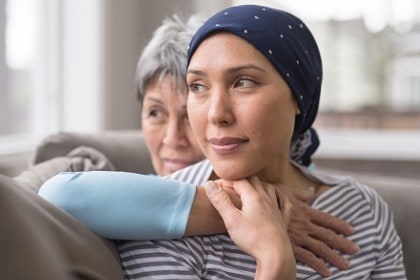
Menopause can also be brought on prematurely and abruptly in women who have been diagnosed with breast cancer and undergone chemotherapy. One day they have fully functioning ovaries and are still having periods, but then the chemotherapy stops that process. The same occurs for women with surgically induced menopause following a hysterectomy.
What About Hormone Replacement Therapy?
Some doctors may advise their patients to combat some of their symptoms of menopause with hormone replacement therapy (HRT). This is controversial because HRT is believed to increase a woman’s risk of different types of cancer, including breast cancer.
You may have heard about a 15-year study called the Women’s Health Initiative that began in the early 1990s to investigate the effects of a combination of estrogen and progestin on women.

The study was ended abruptly, three years early, when the data showed higher rates of heart attacks and strokes, breast cancer, and blood clots for the women taking HRT, compared to those receiving placebo [1]. HRT use by women in the 50-59 age group subsequently dropped by 79% between 2001 and 2011, although it is still prescribed in certain situations.
Natural Remedies for Menopause
Finding natural remedies for menopause and its more problematic symptoms has become a growing area of research since the Women’s Health Initiative. Many studies have found that there are significant benefits to be gained by using plant-based remedies to relieve some of the symptoms of menopause – without the dangerous side effects [2, 3].
Why Essential Oils and Menopause Are a Good Fit
One popular option is essential oils that contain all-natural, plant-derived compounds that have a variety of actions in the body. These plant compounds tend to be significantly anti-inflammatory, antimicrobial, and strong antioxidants.
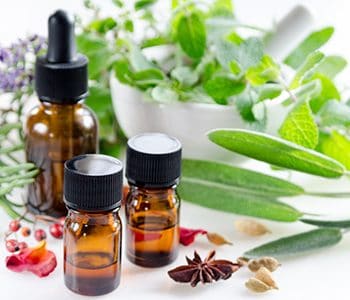
While there are many oils to choose from, the best essential oils for menopause offer hormonal support, assist with brain fog, hot flashes, and insomnia, and a whole host of other menopausal symptoms.
Below is a list of some of the most common bothersome symptoms of menopause, and suggestions on how you could use specific essential oils for menopause to help ease that symptom.
Please note that these tips are not meant to replace the advice of your health professional. If menopausal symptoms persist after trying some of these essential oils for menopause ideas, you should consult your medical professional for further assessment and guidance.
How to Use Essential Oils for Menopause Symptoms
#1. Hot Flashes & Night Sweats
Hot flashes and night sweats likely rank among the most disruptive of all menopause symptoms for women. On a physical level, what occurs with a hot flash is that when your body is searching for estrogen, blood vessels dilate, blood flow increases, body temperature rises, and the heart pumps faster.

The worst is when it happens at an inconvenient time and place such as an important meeting or event. You may suddenly feel a little sick, and then feel like you just might burst into flames. Your face grows red, and you have a sudden urge to drink a big glass of cold water (or throw one over your head) and start looking around for a fan or a window. Many times all you can do is toss off your sweater or jacket, fan yourself with a piece of paper, and hope no one notices.
Night sweats are just as bad, with many women reporting they need to have one or more changes of pajamas and even sheets every single night. Fortunately, essential oils can provide some relief.
Helpful Essential Oils for Hot Flashes:
- Fennel – In clinical trials, fennel has been found to reduce menopause symptoms [2]. Because of the structure of the phytochemicals (natural plant-based compounds) in it, fennel is considered to be a phytoestrogen (plant compound with functions similar to estrogen) with hormone-balancing properties.
- Peppermint – Its cooling properties are wonderful for quickly reducing the discomfort of hot flashes.
- Clary Sage – Helpful for hot flashes and the stress that accompanies them.
- Basil – May be helpful for lowering blood pressure and cooling off hot flashes [5].
- Lavender – Lavender essential oil is calming to the nervous system and reduces cortisol (stress hormone) levels.
TIP: Make your own Hot Flash Cooling Spray. Into a glass bottle with an atomizer, mix together 8 ounces (236 ml) of distilled water, 4 drops fennel oil, 2 drops peppermint, 5 drops clary sage, 3 drops basil, and 4 drops lavender. Shake well before using to combine the oil and water. Spray liberally on face and back of the neck, ensuring to keep it out of your eyes.
#2. Mood Swings, Depression, Stress & Anxiety

If your significant other is complaining that you’re biting their head off a little too often, or you burst into tears at the slightest provocation, just know that this can be a part of the hormonal fluctuations of menopause.
These mood swings can be really frustrating, but fortunately, essential oils provide some relief.
Essential Oils for Hormone Balance:
- Frankincense – Frankincense essential oil eases anxiety, comforts and soothes emotional distress, calms restlessness, and promotes serenity.
- Bergamot – A cross between bitter orange and lemon, bergamot is beneficial in improving mood and mild symptoms of stress-induced disorders.
- Lavender – Well known for its ability to calm the nervous system and ease anxiety and stress. A 2009 study [6] found that lavender significantly improved mood, and reduced anxiety and depression.
- Clary Sage – Clary sage was found in a 2014 study [7], to reduce cortisol levels in menopausal women.
- Rose Geranium – A 2015 study [8] found that geranium oil, especially when combined with massage therapy, reduced depression in postmenopausal women.
- Create a calming blend of lavender, ylang ylang, clary sage, and bergamot for natural anxiety and emotional stress relief.
TIP: Place a drop or two of your choice of essential oils into your hands and breathe in deeply for a minute or two to receive their calming effects. You can also combine oils in an ultrasonic diffuser and place the diffuser in a room where you will be sitting. Another calming idea is to have your massage therapist use these oils on you when you receive a relaxation massage.
#3. Insomnia
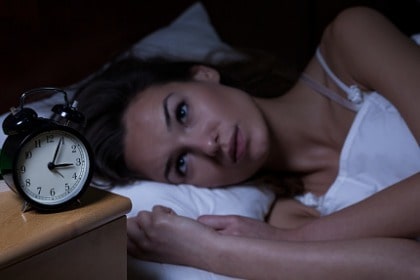
Remember sleep? Wow, it was great when you could actually lie down at night and be asleep practically before your head hit the pillow. But now, either you fall sleep immediately and then a hot flash wakens you, or your mind races and you just can’t seem to settle down… for hours.
Helpful Essential Oils for Insomnia:
- Lavender – A 2006 study [9] found that lavender was beneficial for easing insomnia and depression. A 2012 study [10] found that lavender significantly improved sleep quality in women aged 45-55 years.
- Clary Sage – Relieves anxiety and emotional tension and relaxes muscles, helping you to ease into sleep.
- Ylang Ylang – Soothing to the nervous system, eases muscle tension, calming and comforting.
- Bergamot – Facilitates sleep induction
- Combine a synergistic blend containing all of the above essential oils.
- Chamomile – Reduces stress, has sedative and anti-depressant properties.
TIP: The essential oils of your choice can be applied (either neat or diluted) over the large blood vessels on either side of the neck prior to going to bed, or a drop or two can be dripped directly on your pillow (if you are using 100% pure essential oils without a carrier oil, it should not stain your pillow but it’s a good idea to always test in an inconspicuous spot first). Check out this helpful article for more about the best essential oils for sleep.
#4. Fatigue
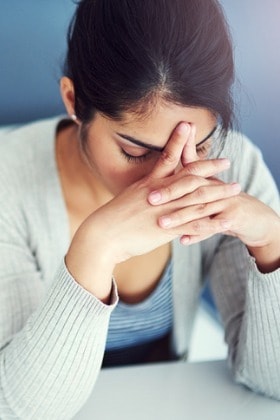
It only makes sense that you’re tired if you aren’t sleeping well. During the time when your body would normally be resting and repairing, you’re tossing and turning and intermittently feeling like you’re bursting into flames if plagued by hot flashes!
By using natural remedies for menopause to combat some of these contributing problems, your fatigue should ease as you begin to rest better. Trying these essential oils for fatigue can help too.
Helpful Essential Oils for Fatigue:
- Rosemary – Stimulates circulation and also the activities of many internal organs including adrenal glands, cardiovascular system, liver, and gall bladder. One study [11] mentioned rosemary as being considered one of the most effective herbs for treating physical and mental fatigue.
- Orange/Grapefruit/Lemon – The uplifting aroma of citrus helps to provide a burst of energy and is a favorite among those with chronic fatigue syndrome.
- Peppermint – A stimulant to the nervous system and widely used to prevent fatigue, peppermint’s fresh aroma wakes up the brain. A 2014 study [12] found that breathing in peppermint significantly improved exercise performance.
- Geranium – Stimulates the cardiovascular system and the adrenal cortex, which regulates hormonal secretion by other organs. Geranium is another favorite for helping to relieve symptoms of chronic fatigue syndrome.
TIP: Make an Energizing Body Oil. Into a glass container with a pump dispenser, combine 1/2 cup organic hempseed oil, 3 drops rosemary oil, 4-6 drops of a citrus essential oil (orange, lemon and/or grapefruit), 3 drops peppermint oil, and 3 drops rose geranium oil. Shake well to combine and apply topically (e.g., to hands, feet, arms, legs, neck) when feeling tired.
#5. Aching joints

Feeling more like you’re 105 than 55 when you move? Aching joints can be caused by the scarcity of estrogen, which is intimately involved with the integrity and good health of a woman’s joints.
Helpful Essential Oils for Joint Pain:
- Ginger – Pain reliever, anti-inflammatory, stimulates circulation, promotes healing.
- Wintergreen – Anti-spasmodic, anti-inflammatory, relieves pain.
- Rosemary – Eases muscle spasms, stimulates circulation, helps relieve pain and inflammation.
- Clove – Has pain-numbing qualities, relieves inflammation, eases arthritis.
- Frankincense – Reduces inflammation and muscle spasms.
- Peppermint – Anti-inflammatory, soothes pain, reduces swelling.
- Marjoram – Relieves muscle and joint pain, calms nerves, eases arthritis.
- Organixx Magi-Complexx – A combination of frankincense, myrrh, and turmeric, three of the most highly anti-inflammatory plants.
- Create an essential oil blend of ginger, wintergreen, rosemary, clove, and frankincense oils.
TIP: Make your own Joint Reliever massage oil by combining 1 Tbsp of organic coconut or hempseed oil with several drops of any or all of the above single essential oils or either of the Organixx blends. Mix well and rub into sore joints. Alternatively, try massaging a few drops of Relief blend or Magi-Complexx blend into aching or swollen, sore joints.
#6. Brain Fog

Brain fog is when it feels like a thick pea soup fog has rolled into your brain, clouding your thoughts, making you forgetful, and losing your focus.
With menopause, it happens because there are loads of estrogen receptors in the brain. Estrogen has a big role to play in brain health so when estrogen output from the ovaries begins to decline, it’s no wonder you’ve just put your vitamins in the freezer and the ice cubes in the pantry!
Helpful Essential Oils for Brain Fog:
- Frankincense – Helps “clean off” brain synapses, thus opening neural pathways so brain function and mental clarity improve.
- Lavender – Its relaxing aroma clears mental processes and sensory overload to promote clearer thinking.
- Peppermint – Improves concentration and wakes up the nervous system.
- Eucalyptus – Revitalizes brain processes and increases alertness.
- Rosemary – Sharpens memory and improves mental clarity.
- Basil – Opens up neural pathways, improves concentration and memory.
TIP: Create your own Clear Thinking Essential Oil Roll-On. Into a glass vial fitted with a roller ball combine a little organic carrier oil (e.g., almond) plus 10 drops each of your favorite essential oils listed above. When brain fog hits, apply to the sides of neck over large arteries, to the back of neck, and wrists, and breathe in deeply. Or simply diffuse the oils in an ultrasonic diffuser in whatever room you’re in.
#7. Headaches & Migraines
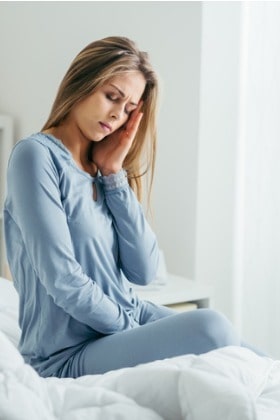
As if hot flashes weren’t challenging enough, along comes a thumping headache to wreck your day. For some women, menopause brings an end to debilitating migraine headaches. But for others, this is when migraines begin.
Again, low levels of estrogen can set off migraines. But there are a lot of other things that can cause headaches such as neck tension, anemia, constipation, eyestrain, and high blood pressure, to name just a few.
Helpful Essential Oils for Headaches:
- Peppermint – Pain reliever, anti-inflammatory.
- Peppermint – Pain reliever, anti-inflammatory.
- Ginger – Relieves the nausea sometimes associated with migraines; eases pain and inflammation.
- Rosemary – Long used in traditional folk medicine to treat headaches and poor circulation due to its stimulating, analgesic, and anti-inflammatory properties.
TIP: Inhale or diffuse any of the above essential oils when you feel a headache coming on. Use a couple of drops with a carrier oil and gently massage into temples or any of the reflexology spots associated with headache relief. (Just Google “reflexology points for headache” to learn where these are located.)
#8. Changes in Skin
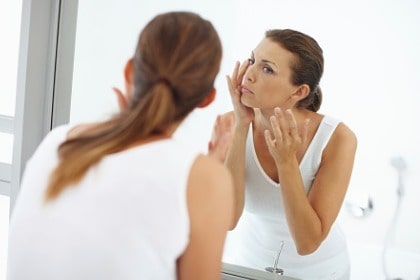
Estrogen improves the content and quality of collagen in the skin, increases skin thickness, and improves blood supply to the skin.
Estrogen is required for the synthesis of skin, mucous membranes, hair, and muscles. That’s why as we age and estrogen levels decline, skin becomes more thin and wrinkled, the hair thins, and muscles shrink. Of course, as many women have been dismayed to discover, the hormonal changes of menopause can also bring on breakouts of acne you thought were long behind you!
Beneficial Essential Oils for Skin:
- Frankincense – Rejuvenating to dry, mature skin, smooths lines and wrinkles, accelerates the healing process. 2017 research [13] showed that frankincense significantly reduced inflammation, promoted wound healing, and modulated the expression of at least 83 genes in human skin cells.
- Lavender – Reduces inflammation, regulates oil secretion, and helps repair damaged tissue.
- Geranium Rose – Considered a natural anti-fungal, anti-inflammatory, antimicrobial, and antioxidant oil. Geranium rose helps with a wide range of skin conditions from dry and wrinkly to oily skin and acne.
- Myrrh – Maintains healthy skin, prevents skin aging and wrinkling, stimulates and regenerates skin cells, promotes wound healing.
- Turmeric – A 2011 study found that skin creams with curcumin extract (a primary compound in turmeric), have photoprotective effects, which means protection against sun damage. If you’ve been a sun worshipper, turmeric oil can be especially beneficial for skin health.
- Organixx Magi-Complexx – A blend of frankincense, myrrh, and turmeric essential oils, which are all known for their highly beneficial skin-repairing properties.
TIP: Go here to learn how to make your own DIY skin creams using the best essential oils for skin.
#9. Vaginal Dryness
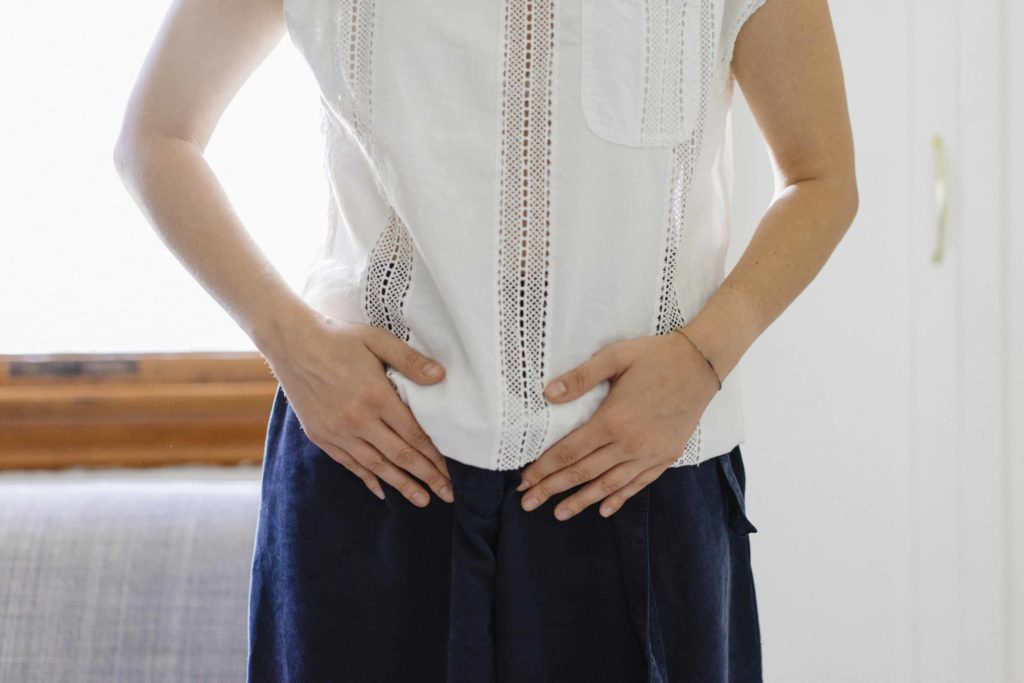
Also linked to declining levels of estrogen, vaginal dryness is a particularly unpleasant problem that often leads to painful intercourse and can make a woman feel like her private parts have turned into the “Sahara desert.”
Physicians generally treat this condition with hormone replacement therapy, but as discussed above this is not always desired. Here is a natural remedy for menopause using essential oils for vaginal dryness that may help.
TIP: Make your own “Anti-Sahara” Soothing Balm. You’ll need 1 tablespoon of organic calendula-infused oil, 1/4 cup organic Aloe vera gel (it must be organic, with as few chemical ingredients as possible), 1 capsule (opened) natural vitamin E (d-alpha tocopherol) oil, 2 tablespoons organic coconut or hempseed oil, and 1 drop of Magi-Complexx oil.
Mix all together and keep balm in a sterilized glass jar or tin in the refrigerator. Use a clean spoon to dip it out of the container for use and never double-dip. Considered safe for external and internal use, but always test for sensitivity on your wrist or inside of your thigh before applying in or around vaginal area.
#10. Lack of Desire

Many menopausal women lament the state of their love lives.
A sharp decline in estrogen and other hormones, combined with vaginal dryness (see #9 above), can certainly affect a woman’s desire in the physical love department.
Helpful Essential Oils for Libido:
- Lavender, Fennel, Geranium, Rose – A 2018 review of medical studies [14] found that these four essential oils significantly improved sexual desire in menopausal women.
- Neroli – A 2014 study [15] found that neroli had a significant impact on sexual desire in menopausal women. It also reduced blood pressure and improved estrogen levels.
- Anxiety and not feeling “in the mood” go hand in hand. The calming blend of lavender, ylang ylang, clary sage, and bergamot can help put you in a more relaxed state conducive for intimacy.
TIP: Diffuse any or all of these essential oils and/or apply topically diluted with a carrier oil to help put yourself into a more romantic mood. Better yet, take a relaxing essential oils bath.
Essential Oil Quality Is Vitally Important
The quality of essential oils varies widely, so it is extremely important that you purchase only high quality, therapeutic or food-grade essential oils – not fragrance oils.
If you intend to use essential oils for health improvement, be sure to purchase from a trusted source that uses organic growing procedures and proper distillation methods.
The powerhouse trio of herbs in Magi-Complexx provides the strongest, most synergistic healing effect, helping sufferers of arthritis pain, constant muscle aches and pains, neuropathy, systemic inflammation, slowed wound healing, circulatory challenges, as well as skin irritations like eczema, psoriasis, and acne.

 Sources:
Sources:
Article Summary
While no two women experience perimenopause (the years leading up to menopause) the same way, it can be a challenging time for many women.
A woman is considered officially in menopause when she has not had her menstrual period for 12 months. This usually occurs between 50-55, although it can happen both earlier and later.
Some doctors advise patients to use hormone replacement therapy (HRT). This is controversial because HRT is believed to increase a woman’s risk of different types of cancer, including breast cancer.
Many studies have found significant benefits with using plant-based remedies to relieve some of the symptoms of menopause – without dangerous side effects.
The best essential oils for menopause offer hormonal support, assist with brain fog, hot flashes, and insomnia, and a whole host of other menopausal symptoms.
If you intend to use essential oils for health improvement, be sure to purchase high-quality oils from a trusted source that uses organic growing procedures and proper distillation methods.

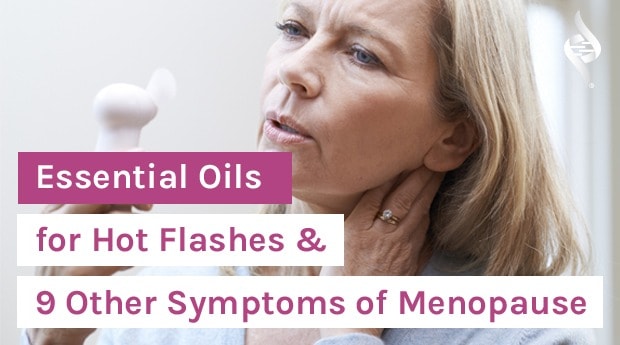


I’m not into making my own
Just weaning myself off of HRT since I’m still hot flashing anyway for 13 years now. Turning 60 in November
I see that you sell blends but I do not see one for the hot flashes?! Have I read it wrong?
Thanks
Hello Gail, it's nice to hear from you! Thank you for your feedback and for your interest in the Organixx Essential Oils.
You are right, there is no Organixx Essential Oil blend that is specific to hot flashes, although as mentioned in the article both the Relief blend and the Relaxx blend are beneficial for menopause symptoms overall. Also, there are individual oils that may prove helpful (e.g., peppermint & lavender). You may use this link to see all the Essential Oil variants that were mentioned in the article for your reference: https://shop.organixx.com/#essential-oils.
Please let us know if you have more questions; we're here to help! Have a great day!
Thank you so much for this article. I have been searching for some time on information like this - for example, why hot flushes even occur, and this is the first article I have read that actually tells me.
You're welcome, Kirrilie! We are pleased to know that you found this article informative. Learning more about menopause and its symptoms is a great step to living your best during this stage of your life.
We hope you can look out for our latest posts and let us know what you think of them.
We look forward to hearing more from you! Have a great day ahead!